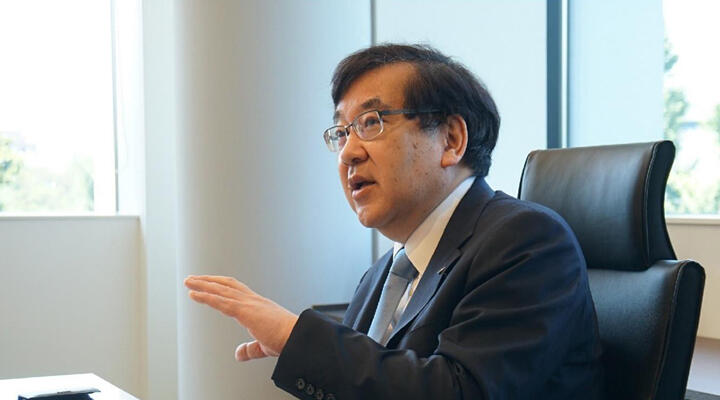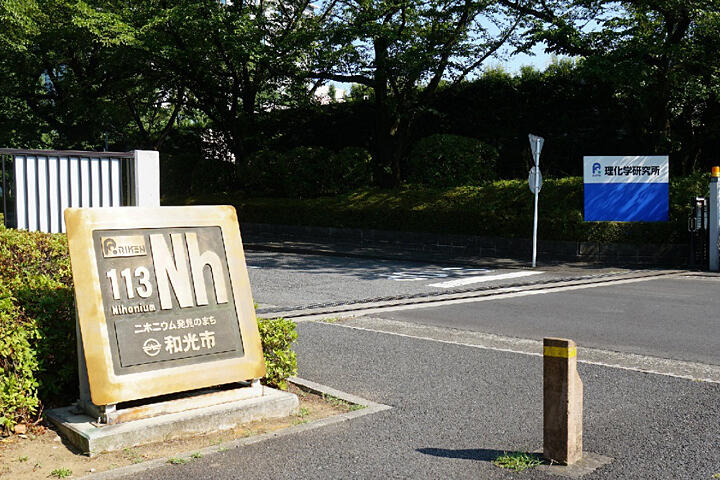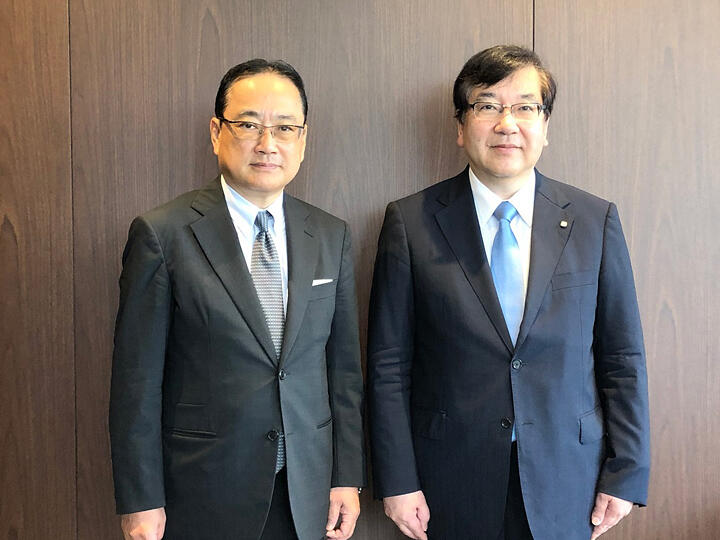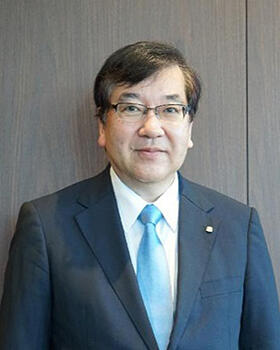In this interview for the International Brain Circulation series, we spoke with Dr. Makoto Gonokami, President of RIKEN.

Announcement of 'Vision 2030' after assuming the position of President
── Last year, you were appointed as President of RIKEN and announced your vision for 2030. I would first like to ask you about this vision, the current overall status of RIKEN, and the specific aspects you are focusing on as president.
Gonokami: RIKEN was founded in 1917. Amidst the First World War that broke out in 1914, Japan faced difficulties as its imports of medicines and industrial raw materials were disrupted and people became aware that there were limits to the policy, adopted since the Meiji Restoration, of basing Japan's development on the adoption of technology from advanced countries. Japan, as a resource-poor country, needed to develop industry through originality, rather than imitation. Dr. Jokichi Takamine, a famous Japanese chemist, explained to Eiichi Shibusawa, 'the father of Japanese capitalism,' that "the future of the world will undoubtedly be an era of chemical and physical industry rather than mechanical industry," and the concept of a national institute for the study of "pure physical and chemical science" was conceived and established based on this vision. Scientists would conduct research freely and excitedly, and new ideas would be born, as their interactions with fellow researchers went beyond their immediate problems. This concept was later described as a "free paradise for scientists," and the drive to create such an exceptional research institute is the very essence of the "RIKEN spirit."
Now, in a new era, the question of what RIKEN should do next naturally arises. It is not enough to simply worship the "RIKEN spirit" that has been passed down over a hundred years. Economic value has shifted from goods to services, and the social economy has been undergoing a paradigm shift from the capital-intensive model that supported rapid economic growth in the 20th century to a knowledge-intensive model. We must re-examine the "RIKEN spirit" from a modern perspective and present a new vision of our own. With these issues in mind, we formulated a new action guideline, "RIKEN's Vision of the 2030 Horizon," and announced it in August last year. In these guidelines, we emphasize that the discovery of knowledge is exciting and fun, and that research is an intensive effort driven by one's curiosity to accomplish one's goals. We believe that it is important for us, as a National Research and Development Institute, to be aware of our contribution to society but also to be firmly committed to curiosity-driven research.
It is important to ensure that what researchers find interesting and want to explore aligns with humanity's future aspirations. We work with excitement on cutting-edge research that could serve as breakthroughs and lead to solutions to the problems that plague humanity, caused by a lack of knowledge, and also produce results. Through these efforts, we are working to gain the trust of society and create a virtuous cycle, gaining Japan global respect and achieving future-oriented growth. We have included the creation of an environment conducive to the effective promotion of such a cycle and the mechanisms for its realization.
Today, humanity is facing a wide range of challenges. For example, issues such as global warming, energy problems, social fragmentation, and growing inequality cannot be solved with existing knowledge alone; they require new wisdom. If solving them requires the creation of wisdom, then the driving force behind it must be human resources. It is important for many young people to approach the challenges they face with a strong sense of curiosity, find enjoyment in them, and work hard with a positive attitude.
Indeed, when we look at the world today, we see a constant stream of new wisdom and technologies that were unimaginable in the past. An mRNA vaccine against COVID-19 was developed in a remarkably short period of time. In the last 10 to 20 years, many completely unexpected findings have emerged related to iPS cells, genome editing, quantum computing, generative AI, and much more. Behind these findings is, without a doubt, digital innovation (DX: Digital Transformation). Digital data have been accumulated from various phenomena, and dramatic advances in semiconductor electronics, the internet, and artificial intelligence technologies have enabled us to analyze and use these massive amounts of data all at once. This DX has brought us to an era of discontinuity, with paradigm shifts that diverge from the conventional linear model. It is here that the traditional distinctions between whether research is basic or applied, long-term or short-term, loses much of its significance. It will become essential from the perspective of industry and national strength to raise research capabilities to a high level while starting with free ideas. I would like to create a place where top-level researchers come together, challenge each other, and generate synergistic effects to successively create new wisdom. This was my vision when I became president of RIKEN.
In the first month or two after I became president, I visited all of our research centers and talked face-to-face with the researchers there. It was very interesting to see how everyone, without exception, spoke with confidence and vibrancy and a sparkle in their eyes. RIKEN has a program called the "RIKEN Hakubi Fellows Program" established in 2017, which offers exceptionally talented young researchers the opportunity to independently lead research as laboratory heads (team leaders) and shapes them into next-generation global leaders. I interviewed all of the dozen or so researchers who are currently conducting research under this program. They were all ambitious and unique, and I was drawn to their research stories. Many conversations extended beyond the scheduled 30 minutes, often lasting an hour or an hour and a half, and I found that the program was going quite well.
However, I had some concerns. The stories I heard one day at one center and those I heard the following day at a different center were extremely closely linked, and while I initially assumed that they were naturally discussing each other's data analysis methods and other issues daily, in reality, this was not happening very much. Interaction across centers seemed quite limited. This seemed like a pity to me. RIKEN has extremely talented researchers, and I felt that if there were a mechanism to actively connect them, they would be able to unleash their potential even more. With this sentiment in mind, last year we launched an initiative called TRIP (Transformative Research Innovation Platform of RIKEN platforms). TRIP is intended to organically link RIKEN's strengths in cutting-edge research platforms (such as the supercomputer Fugaku, quantum computers, the large synchrotron radiation facility SPring-8, the X-ray-free electron laser facility SACLA, and bio-resource projects) to effectively create new fields of knowledge across research fields and to build innovative research platforms.
We launched this initiative last year and first of all looked at the reaction of our researchers. During a presentation on activities for the next fiscal year, we asked the presenters to explain how their plans related to the top-down vision of the TRIP initiative to allocate the additional budget required for its implementation. Although this was only a few months after the TRIP initiative was presented, RIKEN researchers were quick to respond. Research projects associated with TRIP already account for nearly 50% of the budget requests from each center for this fiscal year. TRIP is gaining attention as an innovative scheme from our international advisory committees, and we hope that this initiative will generate a centripetal force. Currently, the plan is being further developed and deepened in anticipation of the next fiscal year.


Transforming the structure of industry into a future-oriented one through the power of academia
── In relation to the issue of global warming, there are arguments that humans have gone too far and should halt, restrain, endure, and hold down economic growth.
Gonokami: I feel uncomfortable with such an argument. The flow of time is irreversible; we cannot just go back in time. Instead of halting growth, we have to constantly generate new wisdom and solve the problems as we explore the way in which we have promoted growth. The problems have become clearer, but it is not as simple as just following a roadmap and steadily moving forward with a plan, as was the case with the growth model based on manufacturing during the 'Economic Miracle' period of rapid growth. We must tackle the challenging task of creating value itself.
RIKEN views basic scientific research as a source of opportunities for future growth and believes that it is important to first focus on this source, which will create new value and pave the way for the development of new industries. While collaborative activities between industry and academia have been a part of RIKEN's culture since its founding, what is needed now is not simply to deploy past research achievements into existing industries but to transform the industrial structure into a future-oriented one in order to propel all of Japan's industries forward. The power of academia should be harnessed for this purpose. Currently, it is not easy to find future-oriented investment opportunities in Japan, but for industry to take risks and change to meet the challenges of the future, it is necessary to reflect on how to successfully develop and use the outcomes of cutting-edge research. When I interact with top executives of Japanese and international companies, I often feel that many foreign CEOs naturally have such a mindset. There are such business leaders in Japan as well, but they remain a limited commodity.
To incorporate new wisdom into new industries, it is also important to create mechanisms to foster technology-based ventures. Again, Japan lags behind Europe and the United States in this area. One reason for this is that Japanese venture capitalists tend to seek quick returns. They seem to believe that it is advantageous to go public early while still small. Big tech ventures, where patience is the name of the game, will not grow with such an approach.
When I became President of the University of Tokyo in 2015, about 200 venture companies had originated from the University, but by the end of my six-year term, that number had increased to nearly 500. The area around the University of Tokyo campus began to be called "Hongo Valley" (although topographically, the area is more of a "hill"). At RIKEN, we would like to strategically focus on contributing to the creation of an ecosystem in Japan that will produce technology ventures. We would also like to work together with overseas investors and companies while consulting with the government. If Japan isolates itself from other nations and operates only within its borders, it will lose opportunities for growth. It is crucial to actively proceed with overseas partnerships. As a national research and development institute, RIKEN can take on the role of proactively moving a step beyond what universities are able to do.
Meanwhile, the international environment has become extremely complex and delicate. Significant improvements in management capabilities have become essential to address issues such as research integrity, including both domestic laws and regulations and those of partner countries, in a proper and appropriate manner. Rather than regulating researchers' international activities, we need to provide an environment that allows them to actively engage in international research activities without being exposed to risks. RIKEN's top researchers already have a fairly extensive global network, and internationalization could be further promoted by systematically enhancing functions related to research integrity.
Acquiring excellent researchers
── To achieve outstanding research results, it is necessary to acquire excellent talent both in Japan and globally, and competition for talent acquisition is expected to intensify further in the future.
Gonokami: Today, a significant paradigm shift is underway regarding core values, and it is possible that the evaluation of what is usable versus what is useless will take a 180-degree shift, even among the wisdom accumulated to date. We would like to add new wisdom to contribute to the creation of desirable value while using information science and efficiently grasping these new evaluation criteria. There are many examples of technologies that had a hundred reasons not to work as a business in the past but nowhere the situation has fundamentally changed, leading to emerging new business opportunities. For those who make their living from the joy of discovery, there might never have been a more exciting time than today.
In this sense, RIKEN should be a place where young people gather, seeing it as a place where they can be excited about doing interesting research. We should be a center that seeks a positive way forward, works toward that goal, and pioneers the cutting edge without being pessimistic about the future. Excellence at a global level is an essential prerequisite. If a number of places like this existed in Japan, it could become a country that is highly respected and esteemed internationally. This is where RIKEN's role lies. We will firmly communicate externally that we are such a place, along with our vision. It is important to clearly demonstrate our activities. In this respect, Japan is still lagging behind Europe and the United States. Another problem is that the total number of people interested in scientific matters is low.
Above all, it is critical that researchers at RIKEN find joy in their work, and there is an urgent need to convey the dream that guides us. We must strengthen our publicity both in Japan and abroad to find ways to deliver these messages. Above all, we must attract people from all over the world who are doing or want to do high-level research. To achieve this, RIKEN will have to continue to change many things.
Last year, the issue of fixed-term employment for researchers came under focus. However, fixed-term employment itself is a necessary employment system that needs to be kept in place by world-leading research institutions. Fixed-term researchers demonstrate their expertise in a diverse range of projects, focusing intensively within a given timeframe, and achieving significant results in response to the challenges of the times. Many of those who have participated in these projects have made the most of their experience and continued to be successful as researchers. However, to ensure that this system can operate reliably, the stability of the entire employment system must be enhanced for all researchers, not just those at RIKEN. This will create an environment where a strong commitment to projects will have a positive impact on a researcher's lifelong career. With this in mind, we are advancing reforms in the employment system at RIKEN.
Furthermore, career paths at universities are perceived as very difficult for today's youth, as it takes many years to attain a professorship. Therefore, RIKEN has established a new system (RIKEN Early Career Leaders Program) to help young researchers obtain Principal Investigator (PI) positions that will allow them to freely conduct research based on their own ideas.
On the other hand, the current conditions offered by RIKEN to researchers are still not attractive enough by global standards, and this presents a serious problem. Due to the rapid weakening of the yen among other factors, the salaries and other benefits for young researchers at RIKEN have clearly become less attractive. RIKEN is making urgent efforts to improve conditions by, for example, raising salaries by tens of thousands of yen for Special Postdoctoral Researcher Programs, a program for young researchers who have obtained their doctoral degrees within the past five years.
Assessments of the salaries for guest researchers from overseas have been fairly uniform. However, because situations differ depending on fields and circumstances, we are moving dynamically toward a much more flexible approach after a thorough evaluation. We would be able to hire the people we need even if their salaries are higher than that of the president. By doing so, we hope to attract top researchers in highly competitive fields to join RIKEN. System-wise, we have already eliminated salary caps, and we will make sure that it will operate properly.
To achieve both mobility and stability for researchers, there are limitations to what RIKEN alone can do. Many aspects of Japan's overall employment system need to be modified to reflect a global perspective. It will be desirable to develop labor laws and regulations suitable for the field of research. We, who are working in the field also need to firmly propose changes to the system. There is also an urgent need to correct the gender balance among researchers. Japan's current situation is often referred to as "sick" from a global perspective. Even if it may seem to be a little forceful, we must move forward with a sense of urgency. We are considering what RIKEN can do, such as creating a system to recruit a large number of female researchers.
Internationalization means contributing to the diversity of global knowledge by offering Japan's unique wisdom
── What are your thoughts about approaches toward the internationalization of R&D?
Gonokami: Firstly, we need to consider the purpose of internationalization. I don't think it is something like simply competing with existing global standards on the same field in order to raise rankings and attract top talent from outside.
Humanity faces many intellectual challenges, and these challenges are rapidly becoming clearer. To produce the wisdom to solve them, it is important to have diversity in the soil in which it is produced. I believe that there is a unique wisdom that can only be produced in Japan. If there is a portfolio supporting the diverse knowledge of the entire world, there must be unique fields that Japan should support. If we can uncover such fields and more proactively deploy them globally, Japan would be able to make remarkable contributions to making the entire planet a better place. If such a unique wisdom exists, people from all over the world will come to Japan hoping to learn it. While I was at the University of Tokyo, I spoke of "supporting global diversity." This means that we should not force our universities to fit into the Western university model.
Japan is different from Europe and the United States in many ways, but that is not necessarily a bad thing. Perhaps these differences could be a significant strength for humanity as a whole and might serve as catalysts for new solutions. Therefore, we must have confidence in the fact that we possess something different. While Europe and the rest of the world strive to successfully integrate diversity, Japan needs to be aware that it is in a position to offer elements of that diversity. Not merely for Japan's own sake, it is necessary to create an environment in which people outside Japan will see the need for such Japanese diversity.
For this purpose, people need to see ourselves objectively from an early stage in life to understand our identity from a global perspective. The best way to do this is to go overseas.
RIKEN's international strategy: building a global knowledge network
Gonokami: I think that the significance of spreading Japan's unique culture and scholarship throughout the world, and in doing so contributing to humanity as a whole, is increasing. In my experience, what attracts the interest of many people is not trendy research, but original research that no one else can do. I would like to actively communicate this uniqueness to the outside world, create a situation that makes it clear that such research is only possible in Japan, and attract people who find it interesting. To achieve this, we need to provide robust support as well for the people who together with us to give them the confidence that they will be able to survive in life outside their research. It will be necessary to provide appropriate support, including addressing issues such as jobs for spouses and children's schooling. RIKEN needs to further strengthen this support.
At RIKEN we are aiming to promote an effective international strategy by actively connecting individuals, including Japanese, who are based overseas and creating knowledge, thereby generating synergies, rather than simply attracting foreign researchers as part of our research workforce. It would be ideal to attract people to our campus, but if it is not possible, I believe it will also be effective to increase the number of overseas research laboratories with agreements in the form of remote cross-appointments to facilitate remote collaboration.
In fields such as quantum computing, where researchers are competing at the cutting edge, leading-edge researchers need to work together. We need to establish an "always-connected" relationship in which information can be shared in the lab notebook phase before a paper is written and where discussions can take place daily, even if this means doing them remotely. This is already common in Europe and the United States, and Japanese researchers will fall behind if they are the ones who only get information by reading papers after they are published. In our next Medium- to Long-Term Period plan, we would like to set up a kind of remote office to allow such researchers to be connected via RIKEN. This will also allow international collaboration to progress in a natural way. Competition is, of course, necessary; however, it is important to be able to share cutting-edge information quickly. I believe that realizing such overwhelmingly advanced international collaboration platforms at RIKEN will generate a positive effect on the internationalization of research throughout Japan.
Furthermore, the experience of the COVID-19 pandemic has reaffirmed the need for face-to-face discussions, as the value derived from them is of great significance. We need to have deep discussions in an environment that allows us to see each other's facial expressions, trust each other, and occasionally share secrets. Even if most work is done remotely, finding time to physically visit each other remains crucial, and overseas offices are necessary for this purpose.
The RIKEN BNL Research Center, established at Brookhaven National Laboratory (BNL) in the United States, recently celebrated its 25th anniversary. It is one of the most highly regarded examples of science and technology collaboration between Japan and the United States, and it functions as a hub for international brain circulation that nurtures young research talent. The center has produced many outstanding researchers. I have heard that in the United States, when people think of RIKEN, this center stands out. I believe that one of RIKEN's missions is to use centers like this as a starting point to actively contribute to diversity around the world by offering elements of diversity born in Japan.
At RIKEN, there are many people who are worthy discussion partners for talented researchers from outside. It is my responsibility as president to make sure that people understand this and to determine who is the best audience to share this information with so as to take advantage of its value. Disseminating information in a vague manner does not produce results. It is necessary to communicate well with the world's truly best and brightest class, the top researchers, to ensure that our message resonates fully and reliably.
There are examples of young Japanese researchers who have conducted excellent research in Europe and the United States but were not able to achieve explosive success after returning to Japan. The difference is that there is a lack of quality and depth of daily discussions, such as whether people are gathering together to discuss. Indeed, it is difficult to succeed alone, and some sort of critical mass is necessary. In such cases, it is important not to start from scratch with only Japanese but to successfully connect people who are willing to work together through a global human network. It is necessary to explore various approaches, such as establishing RIKEN laboratories at overseas universities, which may be virtual, allowing young researchers to be stationed there, and employing their professors on a cross-appointment basis. By being connected with each other, we can understand what is going on with potential partners before a paper is published, and if we can discuss their problems together and pool our knowledge, we can also make a contribution to the research.
This must be done quickly now while such human networks still remain. Vaguely saying, "Let's increase the number of co-authored papers" or "Let's provide support for overseas travel expenses" will not change the situation. I believe that we must also actively promote strategic human resource management that consciously connects us with excellent foreign research sites. It is no longer enough just to wait and see, as we have done in the past. Rather, we need to announce that we are launching an international open call for researchers in specific fields. It is important to narrow down the type of people we want to attract in a proactive and strategic way. To bring such researchers to RIKEN, it is essential to make salaries and other conditions more flexible.
What parts of the world should we connect with? Our efforts will not be effective unless we have something that makes the other side actively want to be connected with us. The key is how to set this up. It is not enough to simply fit it into the open-call projects proposed by the government. It is also necessary for RIKEN to make use of our own resources and proceed with our own decision. RIKEN's function is also important in terms of effectively using national investment funds. It is not good enough for the government's open-call projects to be implemented with the entire scheme set in stone from the beginning. We want to establish a scheme that allows proposers themselves to think of how to present new value originating in Japan to the world, and to propose their ideas based on this.

Interview conducted at RIKEN's headquarters in Saitama, Japan on July 25th, 2023.
Interviewer: Yoshihiro Higuchi, Former Director for Global Strategic Issues, (JST)
Editing: Toshio Oka, Editor-in-chief of Science Portal Asia Pacific, APRC, JST

Profile
Makoto Gonokami
President of RIKEN, National Research and Development Institute
Born in Tokyo in 1957. Graduated from Musashi High School and the Department of Physics, Faculty of Science, at the University of Tokyo. After serving as a visiting researcher at AT&T Bell Laboratories in the United States and as a research director of the "Gonokami Cooperative Excitation Project," an Exploratory Research for Advanced Technology (ERATO) project of the Japan Science and Technology Corporation (currently, Japan Science and Technology Agency), he became a Professor at the Department of Applied Physics at the Graduate School of Engineering of the University of Tokyo, in 1998 and the 30th President of the same university in 2015. In 2022, he was appointed as President of RIKEN.
<Overview of RIKEN>
RIKEN, as the only comprehensive research institute for natural sciences in Japan, promotes research across a wide range of fields including physics, engineering, chemistry, mathematics and information science, computational science, biology, and medical science. It was founded in 1917, initially as a private foundation. After the war, RIKEN was reorganized as an independent administrative institution under the jurisdiction of the Ministry of Education, Culture, Sports, Science and Technology (MEXT) in 2003 after having been privatized under the name KAKEN and then became a public corporation. In 2015, RIKEN became a National Research and Development Institute. To disseminate research achievements to society, RIKEN conducts collaborative and funded research with universities and companies, and actively promotes the transfer of intellectual property and other technologies to the industrial sector.
RIKEN website: https://www.riken.jp/en/about/




